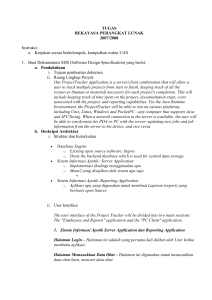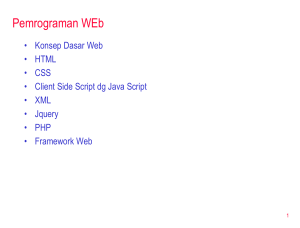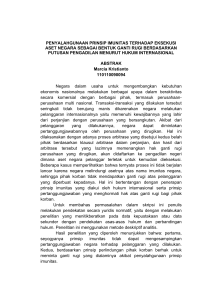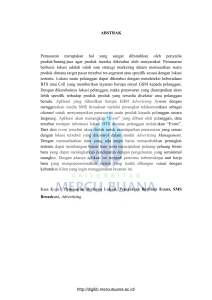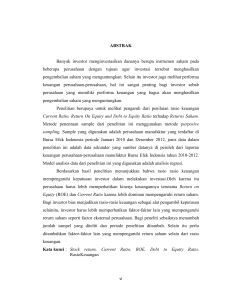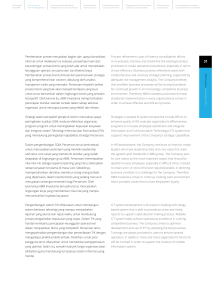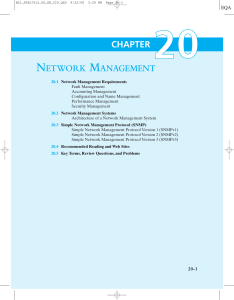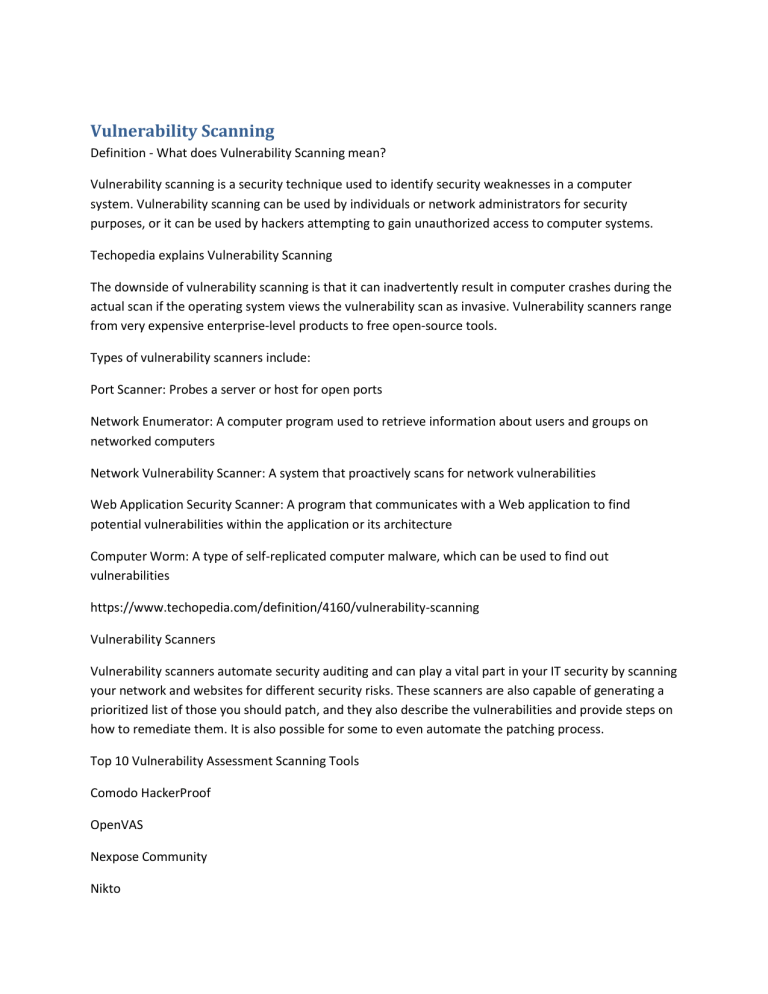
Vulnerability Scanning Definition - What does Vulnerability Scanning mean? Vulnerability scanning is a security technique used to identify security weaknesses in a computer system. Vulnerability scanning can be used by individuals or network administrators for security purposes, or it can be used by hackers attempting to gain unauthorized access to computer systems. Techopedia explains Vulnerability Scanning The downside of vulnerability scanning is that it can inadvertently result in computer crashes during the actual scan if the operating system views the vulnerability scan as invasive. Vulnerability scanners range from very expensive enterprise-level products to free open-source tools. Types of vulnerability scanners include: Port Scanner: Probes a server or host for open ports Network Enumerator: A computer program used to retrieve information about users and groups on networked computers Network Vulnerability Scanner: A system that proactively scans for network vulnerabilities Web Application Security Scanner: A program that communicates with a Web application to find potential vulnerabilities within the application or its architecture Computer Worm: A type of self-replicated computer malware, which can be used to find out vulnerabilities https://www.techopedia.com/definition/4160/vulnerability-scanning Vulnerability Scanners Vulnerability scanners automate security auditing and can play a vital part in your IT security by scanning your network and websites for different security risks. These scanners are also capable of generating a prioritized list of those you should patch, and they also describe the vulnerabilities and provide steps on how to remediate them. It is also possible for some to even automate the patching process. Top 10 Vulnerability Assessment Scanning Tools Comodo HackerProof OpenVAS Nexpose Community Nikto Tripwire IP360 Wireshark Aircrack Nessus Professional Retina CS Community Microsoft Baseline Security Analyzer (MBSA) 1. Comodo HackerProof Comodo’s HackerProof is considered to be a revolutionary vulnerability scanning and trust building tool that enables overcoming the security concerns of your visitors. Following are a few key benefits you can obtain from HackerProof: Reduce cart abandonment Daily vulnerability scanning PCI scanning tools included Drive-by attack prevention Build valuable trust with visitors Convert more visitors into buyers Besides the above-mentioned benefits, HackerProof also provides the visual indicator needed by your customers to feel safe transacting with you. It helps decrease shopping cart abandonment, enhance conversion rates, and drive your overall revenue up. Finally, it includes patent-pending scanning technology, SiteInspector, which is capable of eliminating drive-by attacks, thus providing a new level of security for all those who proudly display the HackerProof logo. 2. OpenVAS This is an open source tool serving as a central service that provides vulnerability assessment tools for both vulnerability scanning and vulnerability management. OpenVAS supports different operating systems The scan engine of OpenVAS is constantly updated with the Network Vulnerability Tests OpenVAS scanner is a complete vulnerability assessment tool identifying issues related to security in the servers and other devices of the network OpenVAS services are free of cost and are usually licensed under GNU General Public License (GPL) 3. Nexpose Community Developed by Rapid7, Nexpose vulnerability scanner is an open source tool used for scanning the vulnerabilities and carrying out a wide range of network checks. Nexpose can be incorporated into a Metaspoilt framework It takes into account the age of the vulnerability like which malware kit is employed in it, what advantages are used by it etc. and fixes the issue based on its priority It is capable of automatically detecting and scanning the new devices and evaluating the vulnerabilities when they access the network It monitors the exposure of vulnerabilities in real-time, familiarizing itself to latest hazards with new data Most of the vulnerability scanners usually categorize the risks employing a medium or high or low scale 4. Nikto Nikto is a greatly admired and open source web scanner employed for assessing the probable issues and vulnerabilities. It is also used for verifying whether the server versions are outdated, and also checks for any particular problem that affects the functioning of the server Nikto is used to perform a variety of tests on web servers in order to scan different items like a few hazardous files or programs It is not considered as a quiet tool and is used to test a web server in the least possible time It is used for scanning different protocols like HTTPS, HTTPd, HTTP etc. This tool allows scanning multiple ports of a specific server. 5. Tripwire IP360 Developed by Tripwire Inc, Tripwire IP360 is considered to be a leading vulnerability assessment solution that is employed by different agencies and enterprises in order to manage their security risks. It uses a wide-ranging view of networks to spot all the vulnerabilities, configurations, applications, network hosts etc. It uses the open standards to help in the integration of risk management and vulnerability into multiple processes of the business 6. Wireshark Wireshark is an extensively used network protocol analyzer considered to be the most powerful tool in the security practitioners toolkit. Wireshark is used across different streams like government agencies, enterprises, educational institutions etc.. to look into the networks at a microscopic level It captures the issues online and executes the analysis offline It runs on different platforms like Linux, masOS, Windows, Solaris etc. 7. Aircrack Aircrack, also known as Aircrack-NG, is a set of tools employed for assessing the WiFi network security. Aircrack tools are also used in network auditing It supports multiple OS like Linux, OS X, Solaris, NetBSD, Windows etc. It focuses on different areas of WiFi Security like monitoring the packets and data, testing the drivers and cards, replaying attacks, cracking etc. With Aircrack, it is possible to retrieve the lost keys by capturing the data packets 8. Nessus Professional Nessus tool is a branded and patented vulnerability scanner created by Tenable Network Security. It prevents the networks from the penetrations made by hackers by assessing the vulnerabilities at the earliest It can scan the vulnerabilities which permit remote hacking of sensitive data from a system It supports an extensive range of OS, Dbs, applications and several other devices among cloud infrastructure, virtual and physical networks It has been installed and used by millions of users all over the world for vulnerability assessment, configuration issues etc. 9. Retina CS Community Retina CS is an open source and web-based console that has helped the vulnerability management to be both simplified and centralized. With its feasible features like compliance reporting, patching and configuration compliance, Retina CS provides an assessment of cross-platform vulnerability Retina CS help save the time, cost and effort for managing the network security It is included with automated vulnerability assessment for DBs, web applications, workstations, and servers Being an open source application, Retina CS presents complete support for virtual environments like vCenter integration, virtual app scanning etc. 10. Microsoft Baseline Security Analyzer (MBSA) MBSA is a free Microsoft tool ideal for securing a Windows computer based on the specifications or guidelines set by Microsoft. MBSA allows enhancing their security process by examining a group of computers for any misconfiguration, missing updates, and any security patches etc. It can only scan for security updates, service packs and update rollups putting aside the Critical and Optional updates It is used by medium-sized and small-sized organizations for managing the security of their networks After scanning a system, MBSA will present a few solutions or suggestions related to fixing of the vulnerabilities segala sesuatu yang terhubung pada jaringan, yang memberikan service seperti printer, router, web server mempunyai port yang terbuka untuk menerima connection request jika port yang terbuka tidak terbuka pada device yang digunakan maka device tersebut tidak akan berfungsi. tetapi jika terlalu banyak port yang terbuka, maka kemungkinan bisa mengakibatkan vulnerability. nmap adalah salah satu tools yang banyak digunakan oleh para cyber security, network engineer, dan system administrator nmap memungkinkan kita untuk melakukan scanning terhadap device-device yang terhubung pada jaringan dan menemukan port apa saja yang terbuka, sehingga kita bisa melihat service apa saja yang berjalan pada suatu device. - this course is designed for who are new to Nmap - basic familiarity with system administrations Port 20, 21 22 23 25 50, 51 53 67, 68 69 80 110 Service name File Transfer Protocol (FTP) Secure Shell (SSH) Telnet Simple Mail Transfer Protocol (SMTP) IPSec Domain Name System (DNS) Dynamic Host Configuration Protocol (DHCP) Trivial File Transfer Protocol (TFTP) HyperText Transfer Protocol (HTTP) Post Office Protocol (POP3) Transport protocol TCP TCP and UDP TCP TCP TCP and UDP UDP UDP TCP TCP 119 Network News Transport Protocol (NNTP) 123 Network Time Protocol (NTP) 135-139NetBIOS 143 Internet Message Access Protocol (IMAP4) 161,162Simple Network Management Protocol (SNMP) 389 Lightweight Directory Access Protocol 443 HTTP with Secure Sockets Layer (SSL) 3389 Remote Desktop Protocol TCP UDP TCP and UDP TCP and UDP TCP and UDP TCP and UDP TCP and UDP TCP and UDP



